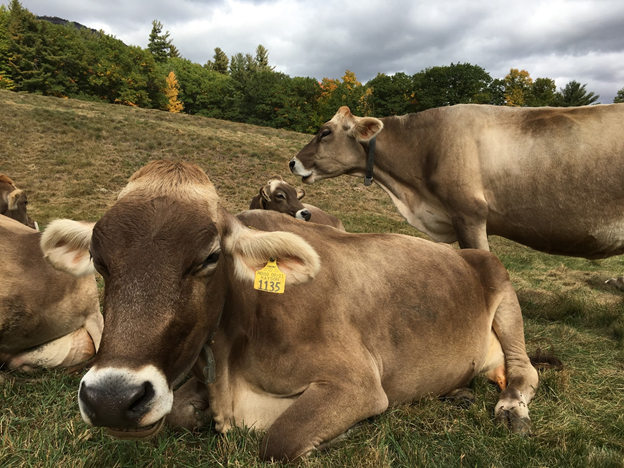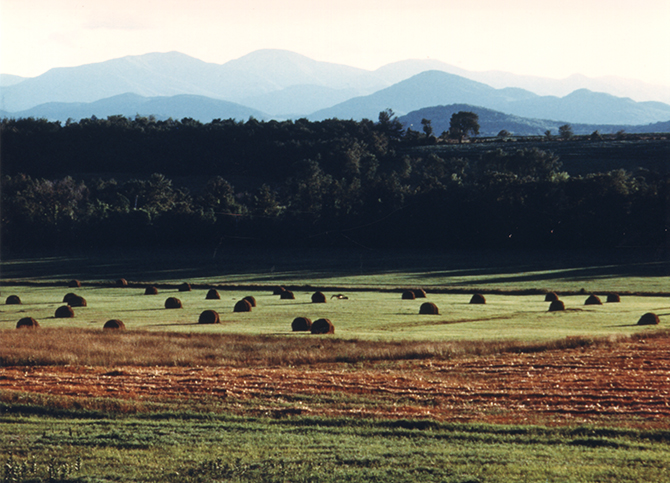
Local Action Needed for Resilient Farms
By Emily Liebelt, Adirondack Council Clarence Petty Intern
Swiss-brown cows at Sugar House Creamery greeted
guests at the 2nd Annual Cheese Tour in October.Resiliency on a farm is both an attitude and a methodology. It takes tenacity to adapt to challenges and put in the work, even when efforts may seem futile. In the wake of our Presidential election, some may wonder how long their tenacity will last when the future seems uncertain. I would argue that it would take more than one election to burst the resilient bubble of our Adirondack farming communities and all the victories farmers won this year. From boosting awareness and interest at the annual Cheese Tour to increasing sustainability with green improvements, Adirondack farms are thriving. The wide range of benefits Adirondack farms give to the communities they belong to and to the environment that surrounds us all must continue, and we mustn’t wait for politics to catch up before we decide to take action.
Small-scale organic farmers in the Adirondacks are fostering biodiversity, limiting external inputs, improving soil health, sequestering carbon, and using integrated holistic approaches to managing pests, weeds and disease. Adirondack farms employ Adirondack people and serve as vibrant communal spaces, where everything from Shakespeare plays to weddings take place. However, all their success is hard-won in a region with many challenges, such as severe weather, dwindling local economies and rocky, acidic soils. There are areas of the Park that have only a few food producers, or none at all. Supporting our existing farms, and encouraging growth in areas that don’t have a supportive farming network, would give more residents of the Park access to high-quality food and the economic benefits that organic farms bring. The benefits of Adirondack agriculture are even appreciated outside of the Park. Reduced shipping distances, on-farm sustainability practices (renewables and energy efficiency), and improved carbon sequestration methods (rotational grazing and silvopasture) make the Adirondacks, and the world, noticeably greener. Agriculture has a unique capacity to mitigate climate change through soil carbon sequestration, forest management and improved nutrient and waste management. Small farmers, who have the flexibility to implement value-added methods and the economic necessity to increase yields through soil quality improvement have the capacity to lead the way on this front. Allocating resources toward the successful futures of Adirondack farmers is a necessary step to ensure our small towns thrive despite challenges posed by our changing climate. The advantages to Adirondack farming are plentiful, and the downsides seem not to exist. To learn how you can support our treasured farms and encourage growth in sustainable agriculture, please read about the Council’s “Cool Farms/Healthy Park” program. The sun keeps rising every day and there is always work to be done on a farm.
The benefits of Adirondack agriculture are even appreciated outside of the Park. Reduced shipping distances, on-farm sustainability practices (renewables and energy efficiency), and improved carbon sequestration methods (rotational grazing and silvopasture) make the Adirondacks, and the world, noticeably greener. Agriculture has a unique capacity to mitigate climate change through soil carbon sequestration, forest management and improved nutrient and waste management. Small farmers, who have the flexibility to implement value-added methods and the economic necessity to increase yields through soil quality improvement have the capacity to lead the way on this front. Allocating resources toward the successful futures of Adirondack farmers is a necessary step to ensure our small towns thrive despite challenges posed by our changing climate. The advantages to Adirondack farming are plentiful, and the downsides seem not to exist. To learn how you can support our treasured farms and encourage growth in sustainable agriculture, please read about the Council’s “Cool Farms/Healthy Park” program. The sun keeps rising every day and there is always work to be done on a farm.
|
|||





